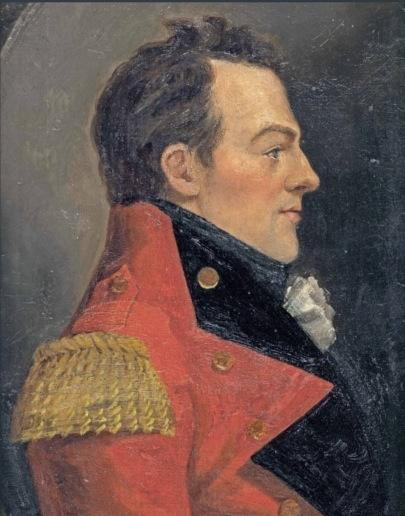When an American army threatened Upper Canada, Major-General Isaac Brock reminded the inhabitants that Britain would not forsake them if they upheld their oaths to the Crown. He also defended native warriors’ rights to protect their property, knowing that he would need their help in the war.
“arise in a Body, exert your energies, co-operate cordially with the King's regular Forces to repel the invader” —British General Isaac Brock

Brock portrait by Gerrit Schipper, c. 1808.
In July 1812, an American army crossed the Detroit River and threatened Upper Canada. British General Isaac Brock knew he needed to move quickly to reassure the population and to halt the American invasion. Upon his arrival in Canada, American General William Hull made a proclamation asking inhabitants to accept his presence and offering them freedom from British rule. As he prepared a defensive force, Brock issued his own proclamation in response.
The enemy, Brock argued, had insulted the British subjects by inviting them to “quiet and unresisting submission” in seeking the protection of the American government. Brock also challenged the inhabitants to recall any time they were mistreated by the British Government, and reminded them that they, unlike the Americans, had access to the enormous trade network protected by the British Navy.
Brock also reminded his audience about duty: “Every Canadian Freeholder is by deliberate choice, bound by the most solemn Oaths to defend the Monarchy as well as his own property.” To forsake that oath, he continued, would be treason.
After imploring the inhabitants, Brock then reassured them. “Let no Man suppose,” he wrote, “that the Province will be eventually abandoned.” The British Government would not make peace with the United States of America unless the security of Upper Canada was ensured.
In the final section of his proclamation, Brock addressed the most grievous statement Hull had made—the threat to refuse mercy to whites caught fighting with native warriors. “Be not dismayed,” Brock wrote, “at the unjustifiable threat of the Commander of the Enemies forces to refuse quarter if an Indian appear in the Ranks.” Brock knew that his army would depend on native warriors to increase their numbers, and the British commander defended natives’ right to protect their property. “They are men,” Brock argued, “and have equal rights with all other men to defend themselves and their property when invaded.”
Brock’s defense of natives was not purely altruistic, because the British forces needed their support. But he also knew from Hull’s proclamation that the Americans were afraid of native warriors. When Brock’s army reached the Detroit River, he formed an alliance with native tribes that would help him defeat Hull.
Last updated: May 24, 2016
